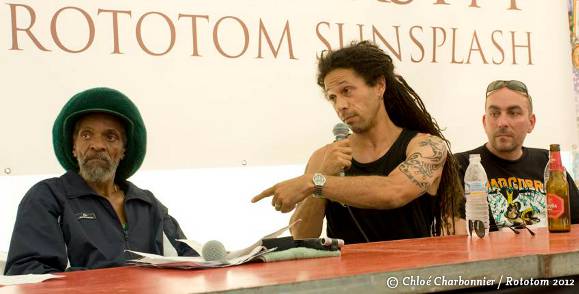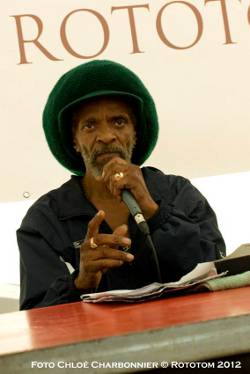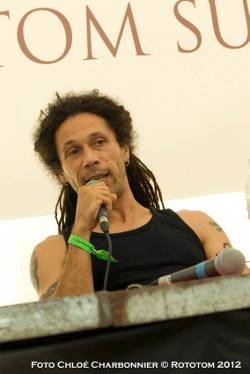Articles about reggae music, reviews, interviews, reports and more...
Jah Shaka and Neil Perch at Rototom 2012

Jah Shaka and Neil Perch at Rototom 2012
Doctors and deans of dub deliver at Reggae University.
On the seventh and final day of the ROTOTOM's Reggae University term, the real doctors and deans of dub graced the campus with their welcome presence. On campus was London town's legendary Jah Shaka, the multi-talented Neil Perch of Zion Train and Professor Christopher Partridge. The latter was the least well known of the guests, but from his base at the University of Lancaster in Britain he recently published the well received book 'Dub In Babylon: Understanding the Evolution and Significance of Dub Reggae In Jamaica and Britain, From King Tubby to Post-Punk' (Equinox Publishing, UK 2010).

Hence it was no surprise that 'Dub In Babylon' was the first part of the day's agenda. Thereafter, delightfully dovetailing with the doyens of dub, sound system culture in Jamaica was addressed in the 'Wake The Town and Tell the People' debate. This enabled special guests Ricky Trooper and his Bass Odyssey sidekicks to share their up-to-date insight on sound system developments on the ground in JA. Both (lively and informative) sessions were ably guided by the University's well-informed panel, comprised of David Katz, Ellen Koehlings, Pete Lilly and Pier Tosi.
Chairing Part 1, Katz invited his guests to address the roots of sound system. Partridge explained that one "can't detach it from the history of Jamaica's culture of oppression" and "this is why the term roots and culture is so important". He even insisted that: "we're dealing with something much more important than popular music". This sparked a review of Jamaican history, from the Maroons to the more recent response via the sound system "against the hegemonic white culture", as the sound system "played to the poor community".
Shaka then pronounced that: "we consider the drum as the first telephone" and "when the people were oppressed they used it to forget about the oppression, to make themselves joyful". He explained that slaves were allowed to bring these instruments because "if they were happy they would work harder". Getting to the point, he reminded us that there was "no radio stations" then. Galloping forward he recalled how he used to play Nat King Cole, the Drifters and the Platters. But due to the pressure of the people he justified the decision that: "we can make music about real things that happened to us as a people". That's where he came in, as: "People are used by Jah as tools", to deliver the music and the message.
 Perch agreed that the sound system is the voice of the oppressed since the 1950s. However it's now a global phenomenon. In reality, he suggested that "it's the voice of the poor, the media". Shaka then entertained all with his recollections of arriving in Britain, where Jamaican house parties ("in houses that might only hold 20 people") were a common refuge. Perch concurred, outlining the problematic predicament of the "wind rushes" (or arrivals from former colonies) to feed the post-World War II labour demand in Britain.
Perch agreed that the sound system is the voice of the oppressed since the 1950s. However it's now a global phenomenon. In reality, he suggested that "it's the voice of the poor, the media". Shaka then entertained all with his recollections of arriving in Britain, where Jamaican house parties ("in houses that might only hold 20 people") were a common refuge. Perch concurred, outlining the problematic predicament of the "wind rushes" (or arrivals from former colonies) to feed the post-World War II labour demand in Britain.
Academic Partridge also offered insights to "the wind rush", that meant Jamaicans dominated Britain's black society in that era. Even Calypsonian Lord Kitchener sang about the merits of trip! However the reality was severe, as they "met widespread racism", coming into what the new arrivals coined the "second Babylon". Partridge summarised that this is the how and the why "Reggae ... politicises people ... it's a multinational global resistance movement".
Addressing the 'God' theme, Shaka noted that: "People were very religious, that led them to study the Bible and how to reach Zion". Then they "came to England in the 1960s to meet a God they couldn't recognise", so "people went searching". This enabled Shaka to deliver a (well) prepared thesis to the audience, wherein he extolled the virtues of education, inspiration, dedication, discipline, intuition, telepathy, loyalty, faith truth, love, honesty and kindness.
This list was peppered with such assertions as "God will store up your reward, and when you need it he will give it to you"; "wisdom is found in the simplest of places' and 'we are a fortunate people, very chosen".
Perch then reminded us that Shaka is "the creative seed for the whole generation of UK music" and "the first electronic dub" he "heard was Shaka's". Turning political, he turned his guns on Italy, "where this festival comes from is one of the most corrupt political systems .. it's a disgrace, it's disgusting". Hence "the sound system has to be a political weapon" as "we have limited chances to express ourselves politically". And in the specific case of Zion Train, they "wanted to tap into the universality of the whole situation", including the techno and rave movements. Coming from her punk rock roots Koehlings agreed that "the most vibrant oppressed but outspoken culture was Rastafari reggae".
 A wide and welcome array of questions were fielded from the floor. These elicited opinions on such matters as dub with vocals, securing appropriate venues for sound systems (especially in Britain), the link between reggae and politics and the responsibility on musicians when composing their messages. This agenda provoked various responses from the panel, including: "Some sound systems too powerful, don't need to be, so people buy ear plugs, that's not good" (Shaka); "everything we do is political", "popular music was the opium of the people .. it is a danger" (Partridge) and "burn all the ketamine in the country" (Perch).
A wide and welcome array of questions were fielded from the floor. These elicited opinions on such matters as dub with vocals, securing appropriate venues for sound systems (especially in Britain), the link between reggae and politics and the responsibility on musicians when composing their messages. This agenda provoked various responses from the panel, including: "Some sound systems too powerful, don't need to be, so people buy ear plugs, that's not good" (Shaka); "everything we do is political", "popular music was the opium of the people .. it is a danger" (Partridge) and "burn all the ketamine in the country" (Perch).
The only regret one could have about this session is that it wasn't long enough. Part 2 was ably facilitated by Koehlings – as the 'Wake The Town and Tell the People' theme enabled special guests Ricky Trooper and his Bass Odyssey sidekicks to tell it like it is in JA today.
Trooper advised that "dancehall in J.A. is the foundation of reggae music", before wailing over the decline of the turntable due to mp3 players etc. "We are losing the roots" and "the sound system is lost in J.A." he admitted. However "reggae is hot" in Europe, Japan, Australia and Africa he added. All 3 speakers did well to explain their introduction to music and their subsequent attainment of status and recognition, before underlining the importance and ferocity of the "sound clash" of rival sound systems in JA. Putting it bluntly, Trooper noted that "some take years to build their career and it's over in one night". But now "everybody is playing the same thing in JA" he regretted to note. Not backward about coming forward, he then listed his various achievements, including enabling the progress of Luciano, Sizzla, Norrisman, Bushman, Anthony B., Garnett Silk and Beenie Man.
And so the University closed its doors for yet another year, satisfied that once again it has contributed a crucial cut to the ROTOTOM festival. With an agenda spanning Jamaican arts, gender equality, roots and culture, dub and distribution, the organisers should line up for the conferral of honorary professorships. Much respect!
Read more about this topic
Comments actually desactivated due to too much spams
Browse by categories
Recommended Articles
Latest articles
Recently addedView all
© 2007-2026 United Reggae. All Rights Reserved. Reproduction in whole or in part is prohibited. Read about copyright
Terms of use | About us | Contact us | Authors | Newsletter | A-Z














